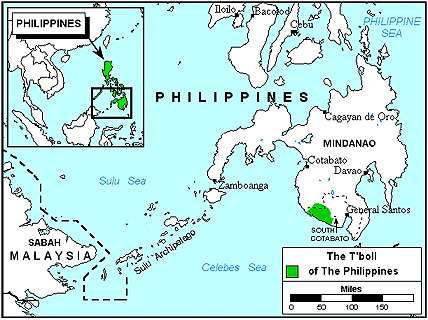|
|
Prayer Profile
The T'boli of the Philippines
![[IMAGE]](../images4/0720.jpg)
The nearly 93,000 T'boli (or Tiboli) are a tribal group in the Philippines. In the past, they were often referred to as the 'Tagabili', but now dislike that name. They primarily live in the South Cotabato province of Mindanao Island, which is located in the southern part of the Philippines. The T'boli speak a Malayo-Polynesian language called Tboli. In addition to their native language, many of the T'boli also speak Ilongo or Bilaan.
The Philippine Islands contain a patchwork of various people groups and religions. In fact, more than 150 ethnic groups inhabit the Philippines. Some of the groups profess Christianity, others are Muslim, and a few follow their ancient animistic religions (believe that non-living objects have spirits).
This great diversity has been the cause of much conflict and bloodshed among the various ethnic groups. The T'boli have often been caught in the crossfire as various groups have battled each other.
What are their lives like?
The T'boli are farmers who practice the swidden (slash and burn) method of agriculture. This involves cutting the forest growth, burning the debris, and planting in the clearing. Rice is their primary crop, though yams and cassava are also grown. Food is also provided through hunting, gathering forest produce, and fishing. To supplement their incomes, the T'boli sometimes sell bananas and other forest produce in nearby markets.
The T'boli live in "long-houses" that are built on six-foot stilts. Homes are generally about 50 feet long and nearly 30 feet wide. They are typically constructed of bamboo, wood, and palm fronds. The people do not live in towns or villages, but live apart from each other in their widely separated houses.
Distinctive and colorful clothing characterizes T'boli men and women and is a major source of ethnic pride. Nearly all clothing is made of t'nalak, which is a cloth that has a brown background, lightened by red and beige designs. Women wear ornamental combs, earrings, bracelets, and rings. The T'boli usually cover their heads with turbans or large circular hats.
Marriages are usually arranged by the families after lengthy negotiations. Weddings are colorful celebrations that often require months of preparation. Monogamy (one husband, one wife) is nearly always practiced. However, the rich may sometimes have multiple wives as a symbol of prestige.
What are their beliefs?
Unlike most people of the Philippines, the T'boli follow their traditional animistic religion, believing that aspects of nature have spirits. If the spirits are not appeased, they can cause the people much harm.
Although the T'boli believe in a great pantheon of gods, the two most important are Kadaw la Sambad and Bulon la Mogow. They supposedly gave birth to the lesser gods, who either bestow benefits on people or afflict them with bad luck or ailments. The T'boli place large wooden statues of the gods in their homes and fields. They frequently offer food and liquor to the gods for appeasement.
What are their needs?
The T'boli have many physical needs. Many T'boli have little or no access to medical care. Education is inadequate, and at least 80% of the adults are illiterate. Running water and modern sanitation systems are virtually non-existent, and electrical power can only be found in a few neighboring villages. Their methods of transportation and communication are extremely primitive. The arrival of logging and mining operations in T'boli territory poses a serious threat to their culture and way of life.
Despite the work of Christians among them, the T'boli continue to serve their various gods, daily living in fear. The New Testament is available in Tboli, but Christian resources such radio and television broadcasts are not yet available.
All around the T'boli, conflicting religious groups continue to battle with each other. These precious people need to find the peace and love that comes through knowing Christ.
Prayer Points
- Ask the Lord of the harvest to send forth laborers into the Philippines and to work among the T'boli.
- Ask the Holy Spirit to grant wisdom and favor to the missions agencies that are currently targeting the T'boli.
- Pray that the T'boli will soon have the Jesus film and radio broadcasts available to them in their language.
- Pray that God will reveal Himself to the T'boli through dreams and visions.
- Pray that God will give the T'boli believers boldness to share Christ with their own people.
- Take authority over the spiritual principalities and powers that are keeping the T'boli bound.
- Ask God to raise up prayer teams who will begin breaking up the spiritual soil through worship and intercession.
- Ask the Lord to bring forth a triumphant T'boli church for the glory of His name!

Statistics
Latest estimates from the World Evangelization Research Center.
THE PEOPLE
- People name: T'boli
- Country: Philippines
- Their language: Tboli (Tagabili)
- Population:
- Largest religion:
- Christians: 4%
- Church members: 3,729
- Scriptures in their own language: New Testament
- Jesus Film in their own language: None
- Christian broadcasts in their own language: None
- Mission agencies working among this people: 7
- Persons who have heard the Gospel: 35,400 (38%)
- Persons who have never heard the Gospel: 57,800 (62%)
THEIR COUNTRY
- Country: Philippines
- Population:
- Major peoples in size order:
- Major religions:
© Copyright 1997
Bethany World Prayer Center
This profile may be copied and distributed without obtaining permission
as long as it is not altered, bound, published
or used for profit purposes.
![[HOME BUTTON]](../graphics/home.jpg)
![[CALENDAR BUTTON]](../graphics/calico.jpg)
![[LIST BUTTON]](../graphics/listico.jpg)
[Home]
[Calendar]
[Country List]
|